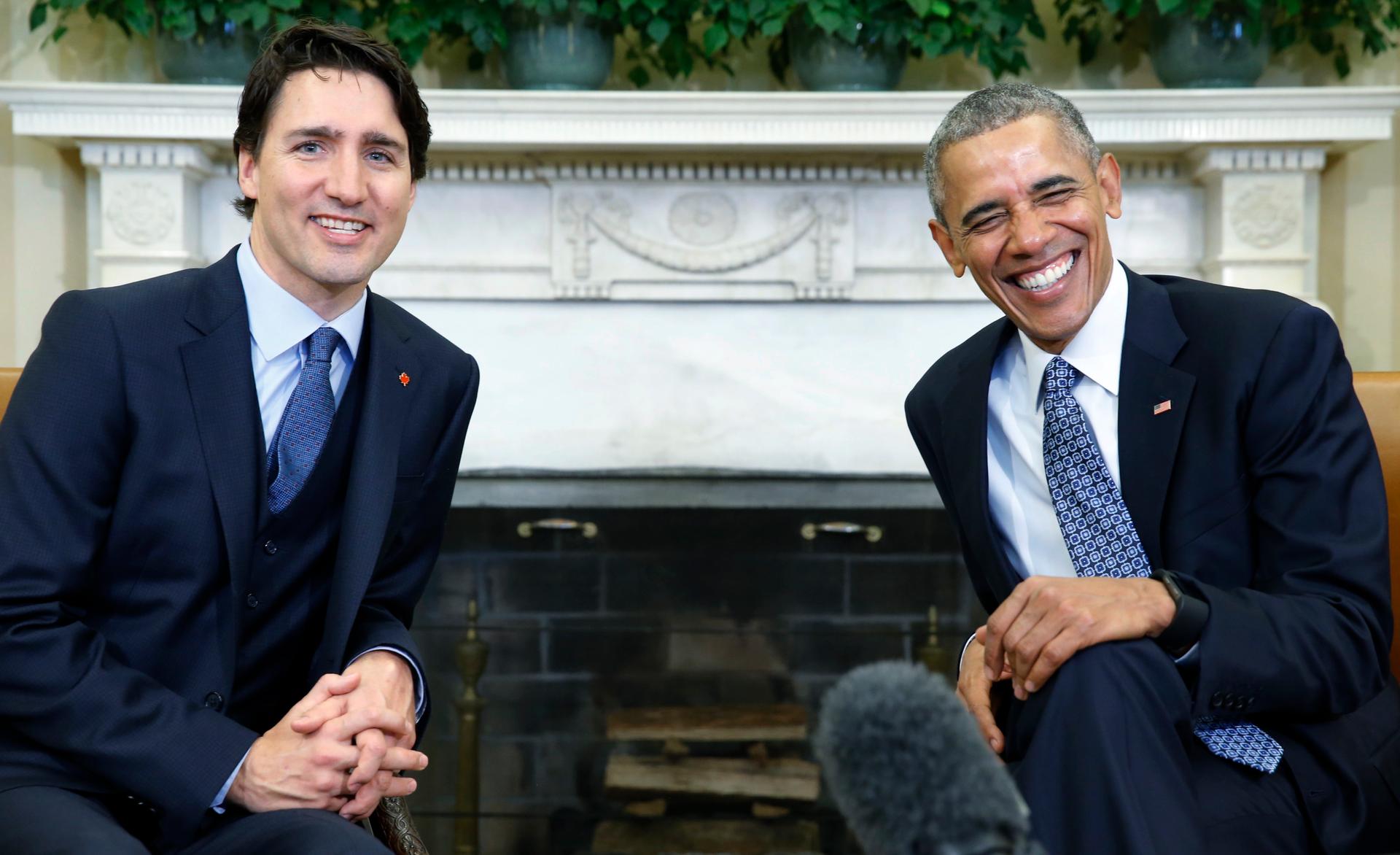Justin Trudeau’s visit warms up the US’ chilly relationship with Canada
President Barack Obama meets with Canadian Prime Minister Justin Trudeau in the Oval Office of the White House in Washington March 10, 2016.
Love your neighbor as yourself?
That was the message President Obama seemed to be pushing when he welcomed newly elected Canadian Prime Minister Justin Trudeau to the White House on Thursday.
“Our great countries have been friends a long time. We grew up together. And like all great enduring friendships, at our best, we bring out the best in one another,” said President Obama during a ceremony welcoming Prime Minister Trudeau.
Though warm feelings were abound, Trudeau’s stateside trip is the first official visit by a Canadian leader in almost 20 years. Why have these next-door neighbors spent so many years apart?
“The relationship has been as frosty as Canada’s climate,” says Diane Francis, editor-at-large at Canada’s National Post. “Between Bush’s Iraq War, which we took a pass on, and the bad relationships that resulted from that, and Keystone, it’s been chilly.”
Back in November, President Obama pulled US support for the Keystone XL pipeline, which would have carried Canadian crude oil through the U.S. and down to the Gulf of Mexico.
Yet, despite the broken deal, Francis, author of "Merger of the Century: Why Canada and America Should Become One Country,” says that Trudeau’s election is bringing a spring-like thaw to the US-Canadian relationship.
“I think one of the first phone calls [Trudeau] had with Obama was to be told that Keystone was going to be nixed,” Francis says. “And he didn’t freak out. He said he was disappointed, but he understood that America can do what America wants to do. So he was very gracious, as Canadians always are. And then the invitation [to the White House] was put in the mail a couple of weeks later.”
On Thursday, Obama and Trudeau announced a joint pledge to combat climate change. Yet the falling price of oil is a big concern for Canada, which has a long history of trading petroleum with the United States.
“A big underpinning for our economy is oil,” Francis says. “Since the oil price has collapsed, our dollar has gone down with it, actually in tandem because it’s known as a petrocurrency. So the Canadian dollar, which was mightily trading at par with the US dollar only three years ago, is now in the sixties. It’s pretty disastrous if you want to take a vacation in Florida, which a lot of Canadians do.”
During the prime minister’s three-day visit, the subject of terrorism will surely be discussed. Back in October, Trudeau called back Canadian fighter jets that were participating in airstrikes against the Islamic State in Iraq and Syria.
“That’s disappointed a number of Canadians as well,” says Francis. “We only had six jets there — we have a tiny, tiny military — but they have stepped up and tripled the number of trainers on the ground who are helping the Kurds. They’re doing their bit, that’s what they’re saying.”
Francis says that Trudeau is not as “militaristic” as his predecessor, adding that he has a “different attitude” towards the threats posed by the Middle East.
Aside from energy and international security, Trudeau and Obama may discuss some lesser known issues, like milk. Yes, milk.
“We do our dairy sector and our poultry sector differently than free trade would like it, and the Americans would like it,” Francis says. “We have a closed shop for dairy, eggs, chickens, and turkeys, and we don’t let Americans export into our market, nor do we export into yours, to be fair. We all pay a little bit more for that stuff so we can keep a few farmers employed. It’s a very controversial farming sector, and it’s a constant irritant with the Americans.”
Many Americans have threatened to move to Canada if Donald Trump or Hillary Clinton win the presidential election in November. Is our neighbor to the north ready for an influx of immigrants?
“There are 34 million people up here, and we’re all Democrats,” Francis says. “I’m a Conservative in the Canadian political scene, but that puts me left of the [American] Democrats — I like our universal healthcare system, and I like a lot of the social democratic traditions that we have here, and so does Bernie Sanders. Clinton is moving towards Bernie, so we’re all kind of getting in synch. Mr. Trump is another matter.”
What about native son Ted Cruz, who was born in Canada?
“He’s a denier,” says Francis. “He’s denied being Canadian and he took up American citizenship without keeping the Canadian [citizenship], which, by the way, you can do if you want to.”
Overall, Canadians are enjoying the 2016 presidential election.
“It’s the best reality show on TV — every week someone is voted off the island,” Francis says. “We really enjoy it. We’re on the other side of the fence looking over and seeing what this noisy, interesting neighbor is doing all the time. It’s quite terrific. Bernie Sanders is perfect — we’d love him. And Hillary too. This is a country of Democrats.”
Aside from gabbing about the election or negotiating over energy and dairy, Obama and Trudeau will likely have some fun, as the president alluded to in his welcoming ceremony on Thursday:
“There are some things we will probably never agree on: Whose beer is better. Who’s better at hockey.”
“We are!” an audience member shoulded out.
“Where’s the Stanley Cup right now?” Obama replied.
This story first aired as an interview on PRI's The Takeaway, a public radio program that invites you to be part of the American conversation.
